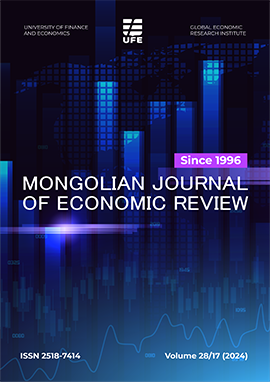Study of the gap in the circular economy practices
DOI:
https://doi.org/10.69588/mjer.v28i17.3484Keywords:
Circular economy, circular economy gap, green certificateAbstract
The agriculture and food sector contributes significantly to Mongolia's GDP (13%) and employs 30% of the population, but its impact on the environment, including waste and greenhouse gas emissions, must be addressed. It has been extensively deliberated by business organizations that Mongolia must propel a circular economy through cleaner production, recognizing it as a long-term goal as well as an urgent one. It is imperative that small and medium-sized manufacturing companies integrate circular economy practices, both to address the sector's negative environmental effects as well as align with broader sustainable development objectives. Our study aims to assess the level of adoption of circular economy practices by Mongolian business organizations, as well as exploring the nuances associated with their implementation. The traditional 3R and 5R principles have evolved into a seven-component model that includes reject, rethink, redesign, reduce, reuse, repair, and recycle. In order to study micro, small, and medium businesses in the agricultural, food, water, and beverage sectors, the 7R principles of circular economy theory were applied. According to the study, farmers, beekeepers, food producers, retailers, and service providers are aware of the basic principles of circular economy practices, yet they fail to implement them.
Тойрог эдийн засгийн туршлагын зөрүүтэй байдлын судалгаа
Хүрээлэн буй орчиндоо ээлтэй үйлдвэрлэл явуулж тойрог эдийн засаг (ТЭЗ) хөгжүүлэх нь Монгол улсын эдийн засгийн урт хугацааны зорилтуудын нэг төдийгүй нэн тэргүүнд шийдвэрлэх ёстой асуудал болох талаар бизнесийн байгууллагуудын дунд өргөн цар хүрээнд яригдах болсон. Монгол Улсын хөдөө аж ахуй, хүнсний салбар нь улсын нийт дотоодын нийт бүтээгдэхүүний 13 хувь, хөдөлмөр эрхлэлтийн 30 хувийг бүрдүүлдэг хэдий ч хог хаягдал, хүлэмжийн хийн ялгарлаар байгаль орчинд сөрөг нөлөө ихээхэн үзүүлж байна. Судлаач нарын үзэж буйгаар салбарын байгаль орчинд үзүүлэх сөрөг нөлөөллийг бууруулах, тогтвортой хөгжлийн зорилтуудыг хэрэгжүүлэхэд жижиг дунд үйлдвэрлэгч нарын үйл ажиллагаанд тойрог эдийн засгийн туршлагуудыг нутагшуулах шаардлага үүссэн байна. Энэхүү судалгааны зорилго нь монголын бизнесийн байгууллагуудын ТЭЗ-ийн туршлагыг хэрэгжүүлж байгаа түвшин, ТЭЗ-ийн туршлагын зөрүүтэй байдлыг тодорхойлоход оршино.
Судалгаанд хөдөө аж ахуйн гаралтай хүнс, ус, ундаа үйлдвэрлэлийн салбарын бичил, жижиг, дунд хэмжээний бизнесийн байгууллагуудыг хамруулсан бөгөөд ТЭЗ-ийн онолын 7R зарчимд үндэслэсэн болно. Уламжлалт 3R зарчим 5R болж өргөжиж, улам боловсронгуй болсоор хүрээлэн буй орчинд ээлгүй үйлдвэрлэлээс татгалзах (refuse), дахин бодох, загварчлах (rethink-redesign), бууруулах (reduce), дахин хэрэглэх (reuse), засах (repair), дахин үйлдвэрлэх (recover), дахин боловсруулах (recycle) гэсэн долоон бүрэлдэхүүн хэсгээс бүрдэж байна. Газар тариаланч, зөгийн аж ахуй эрхлэгч, хоол хүнс үйлдвэрлэгч, жижиглэн худалдаачид, үйлчилгээ үзүүлэгчид ТЭЗ-ийн туршлагын үндсэн зарчим болох хүрээлэн буй орчинд ээлтэй үйл ажиллагаагаа явуулах дадлын талаар мэдлэгтэй боловч тэрхүү дадлыг хэрэгжүүлэх тал дээр хангалтгүй болох нь судалгааны үр дүнгээс харагдлаа.
Түлхүүр үг:
тойрог эдийн засаг, ногоон гэрчилгээ, тойрог эдийн засгийн зөрүү, CE, CE gap
Downloads
338
References
Global Impact Organization. (2022). The Circularity Gap Report.
Ellen MacArthur Foundation. (2015). Towards a circular economy: Business rationale for an accelerated transitions.
Ellen MacArthur Foundation and McKinsey Center for Business and Environment . (огноо байхгүй). GROWTH WITHIN: A CIRCULAR ECONOMY VISION FOR A COMPETITIVE EUROPE.
FAO. (2009). Global agriculture towards 2050. http://www.fao.org/fileadmin/templates/wsfs/docs/Issues_papers/HLEF2050_Global_Agriculture.pdf-ээс Гаргасан
FAO. (2022). http://www.fao.org/food-loss-and-food-waste/en/ -ээс Гаргасан
FAO. (2022). European Commission preparatory study on food waste. https://www.eea.europa.eu/media/infographics/wasting-food-1-ээс Гаргасан
FAO. (2022). Technical Platform on the Measurement and Reduction of Food Loss and Waste. https://www.fao.org/platform-food-loss-waste/en/-ээс Гаргасан
Heshmati, A. (2015). A Review of the Circular Economy and its Implementation. https://doi.org/10.2139/ssrn.2713032
J. Korhonen, A. H. (2018). Circular economy: the concept and its limitations. Ecol. Econ., 143, pp. 37-46. https://doi.org/10.1016/j.ecolecon.2017.06.041
Korhonen, J. (2017). Circular economy as an essentially contested concept . https://doi.org/10.1016/j.jclepro.2017.12.111
M. Geissdoerfer, e. a. (2017). The circular economy - a new sustainability paradigm? J. Clean. Prod., 143, pp. 757-768. https://doi.org/10.1016/j.jclepro.2016.12.048
P. Ghisellini, C. C. (2016). A review on circular economy: the expected transition to a balanced interplay of environmental and economic systems. J. Clean. Prod., 114, pp. 11-32. https://doi.org/10.1016/j.jclepro.2015.09.007
PBL. (2019). Opportunities for a circular economy.
SOFA. (2019). Food waste refers to the decrease in the quantity or quality of food resulting from decisions and actions by retailers, food service providers and consumers.
Stockholm Environment Institute. (2022). Accelerating the transition to a circular economy through impactful and actionable research. SEI Report.
Xing, J. &. (2017). A New Conceptual Perspective on Circular Economy: preliminarily confirmation of the 7R Principle by a descriptive Case Study in Eastern China. .
Статистикийн мэдээллийн нэгдсэн сан. (2022). 1212.mn-ээс Гаргасан
ХХААХҮЯ. (2022). Хүн амын хүнсний хэрэглээ. https://mofa.gov.mn/exp/blog/10/82-ээс Гаргасан
Downloads
Published
How to Cite
Issue
Section
License
Copyright (c) 2024 Tudev Oyungerel, Buyanjargal Bayarsaikhan, Ganbold Sainbileg

This work is licensed under a Creative Commons Attribution-NonCommercial-NoDerivatives 4.0 International License.
Copyright on any research article in the Mongolian Geoscientist is retained by the author(s).
The authors grant the Mongolian Journal of Economic Review a license to publish the article and identify itself as the original publisher.

Articles in the Mongolian Journal of Economic Review are Open Access articles published under a Creative Commons ATTRIBUTION-NONCOMMERCIAL-NODERIVS 4.0 INTERNATIONAL - CC BY-NC-ND 4.0.
This license permits use, distribution and reproduction in any medium, provided the original work is properly cited.




